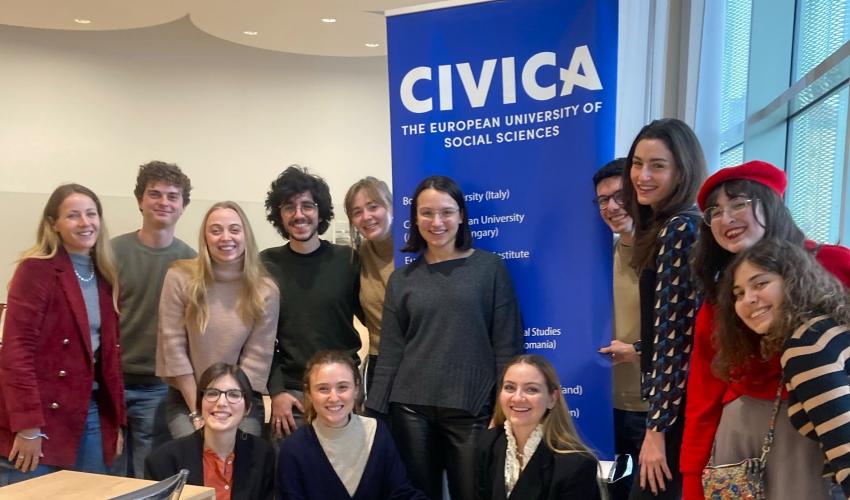
CIVICA Students Delve into the Pressing Challenges of Today's World
THE 4/DAY HONOUR SEMINAR AT BOCCONI SAW MASTER STUDENTS FROM THE ALLIANCE TAKE ON THE TOPIC OF THE ECONOMICS AND POLITICS OF GLOBAL TURBULENCEWith globalization at a crossroads, due to economic and political upheaval worldwide, the world faces pressing challenges and these were at the centre of discussion at the CIVICA Honour Seminar held at Bocconi at the end of January with the participation of students from Bocconi, Hertie School, IE, SGH Warsaw and LSE.
Honour Seminars were devised to offer Master students of the CIVICA Alliance a distinctive learning experience beyond regular courses at their home institutions. They are constructed as 3-5 day learning experiences with the aim of fostering students' engagement in addressing current global issues leveraging upon interdisciplinary approaches, while strengthening and promoting common European values and further enhancing a shared sense of belonging through social/cultural activities.
With the international order in a process of deep transition and transformation – due to reasons ranging from the pandemic to conflicts around the world, to economic and environmental crises - the Honour Seminar at Bocconi took on the topic of ‘The Economics and Politics of Global Turbulence’. It explored aspects of these deep transformations and helped students develop informed arguments on their root causes and consequences on the traditional models of international economic integration and the institutional arrangements underpinning them.
The Honour Seminars foresee as a final assessment a group project to be developed in class. At Bocconi the students worked in groups to develop a 25-minute podcast delving deeper on a topic covered in the classes.
Alexandros Kentikelenis, professor of sociology and political economy and academic director of the Honour Seminar at Bocconi, talked to us about the experience over the four days.
-What did you find most rewarding about teaching at the Honour Seminar?
Engaging with students from CIVICA partners is always exciting, and fostering exchange and collaboration between them and our own students at Bocconi is a rewarding experience. Over four days, we had the chance to discuss globalization and debate how to achieve lasting policy change on pressing topics, like climate change or inequality reduction.
-What distinguishes the experience of the Honour Seminars?
The Honour Seminars offer students the opportunity to delve deeper into issues over four intense days. These are filled with classes and time for group work, and foster cooperation between the students. Ultimately, the goal is not to have traditional lecture-based classes, but encourage learning through classroom debate.
Another peculiarity is that they combine more curricular activities with cultural/social activities, creating a perfect combination of teaching inside and outside the classroom. Here at Bocconi for example, students had a guided tour at Gallerie d'Italia, an art museum, which allowed them to immerse themselves in depth in the culture of the host city, enhancing a shared sense of belonging and community.
-How did interdisciplinary collaboration enrich the experience?
The diverse backgrounds of students were a real strength of the Honour Seminar. With background knowledge of economics, political science, sociology and law, each student brought distinct perspectives to the class conversations. These different lenses of approaching contemporary policy problems helped students question their priors and develop new ways of seeing the world.
-How was the complex topic of economics and politics of global turbulence covered over the 4 days?
We organised the classes around two axes: fast-moving problems, like climate change and economic shocks, and slow-moving structures to deal with these problems, like domestic political institutions or international organizations. This allowed the class to debate what the prospects of dealing with these problems are, and what kinds of reforms are necessary to make policymaking structures more responsive.
by Tomaso Eridani
